英汉翻译论文
英汉对比与翻译期末论文

英汉对比与翻译——词汇三境[摘要]:本文将英汉语言中词语分布做了对比,并就词汇翻译提出了“意译”、“义译”、“化境”三个要求,从而得知,词汇翻译的地道性很大程度上取决于语境的还原程度。
关键词: 译意、译义、臻化、词汇、语境正文:英国语言学家George W.W ilk ins在《语言教学中的语言学》一书中指出:“没有语法,表达甚微;没有词汇,表达为零。
”由此可见词汇在英语中所居的重要地位。
在翻译时,即使一个译者已经掌握了大量的词汇与句法,还是会遇到总不能够突破的瓶颈,这个障碍往往是由词汇,甚至是简单词汇所引起的。
例如:“He is a perfect stranger in the city.”这里对于什么是一个“perfect stranger”的理解与处理会造成译文层次的不同,同时也是考量一个译者的水平。
如果仅翻译字面意思,翻译成“完美的陌生人”,译文显得晦涩难懂;当我们进一步理解“perfect”这个词的含义,并进入意义层面, “perfect”就是“完完全全”的意思,那么“perfect stranger”该译为“完完全全的陌生人”,“他是这城市中完完全全的陌生人”意思准确但是和全句契合不够完美,同“in the city”在搭配上略有滞涩;所以,我们将其转化,将“完完全全的陌生人”这一名词词组转化为动词词组,意为“对……完全陌生”,这句话就可译为“他对这城市完全陌生”,这样的搭配显得协调,不但译出了源语言想表达的意思,“疏离”这一语境也得以完整地保留了。
以上例子就体现了英汉互译中一个很重要的规律,即词性转换。
世界上的语言,不管其各有多少词类,名词和动词都占最大的比例;不管有多少句型,都能归纳为静态与动态两类。
总的来说,汉语呈动态特征,英文呈静态特征。
在词汇的使用上,汉语的动态表现为:汉语的动词丰富,使用频率高;而英语中,名词、介词等非动词性此类的使用频率很高。
据周志培(2003:390)统计显示截选如下:(1)“邓小平在武昌、深圳、珠海、上海等地的谈话要点”及英译语言总数名词介词动词助动非限定动词代词形容词副词数词连词量词冠词词数636167111862741707039178汉语%26%2%29%4%7%11%11%6%3%1%词数907238991051930981044328584英语%26%11%12%2%3%11%11%5%3%7%9%(2)“英国首相撒切尔夫人在中国欢迎宴会上的讲话”及汉译文语言总数名词介词动词助动非限定动词代词形容词副词数词连词量词冠词词数32499972536224215132汉语%31%3%22%2%11%7%13%4%4%0.6%词数36691494119395022132328英语%25%14%11%0.2%2%10%14%6%4%6%8%上述结果表明,若要在英汉互译中,若要翻译出地道的Target Text,就应当尽量符合Target Language的表达习惯。
英汉语言对比论文
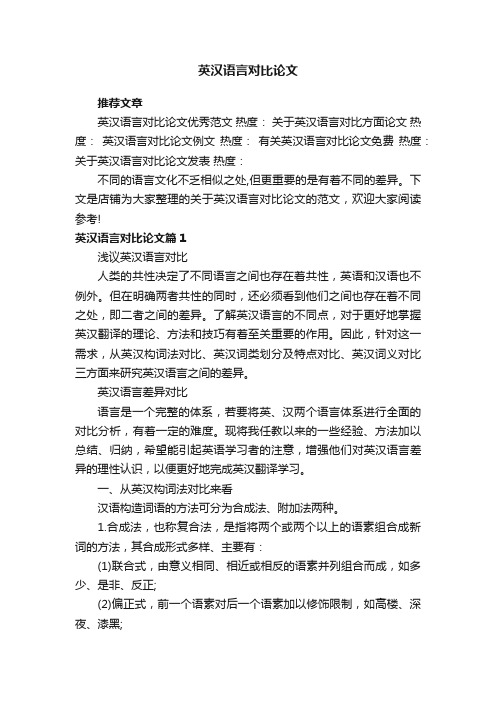
英汉语言对比论文推荐文章英汉语言对比论文优秀范文热度:关于英汉语言对比方面论文热度:英汉语言对比论文例文热度:有关英汉语言对比论文免费热度:关于英汉语言对比论文发表热度:不同的语言文化不乏相似之处,但更重要的是有着不同的差异。
下文是店铺为大家整理的关于英汉语言对比论文的范文,欢迎大家阅读参考!英汉语言对比论文篇1浅议英汉语言对比人类的共性决定了不同语言之间也存在着共性,英语和汉语也不例外。
但在明确两者共性的同时,还必须看到他们之间也存在着不同之处,即二者之间的差异。
了解英汉语言的不同点,对于更好地掌握英汉翻译的理论、方法和技巧有着至关重要的作用。
因此,针对这一需求,从英汉构词法对比、英汉词类划分及特点对比、英汉词义对比三方面来研究英汉语言之间的差异。
英汉语言差异对比语言是一个完整的体系,若要将英、汉两个语言体系进行全面的对比分析,有着一定的难度。
现将我任教以来的一些经验、方法加以总结、归纳,希望能引起英语学习者的注意,增强他们对英汉语言差异的理性认识,以便更好地完成英汉翻译学习。
一、从英汉构词法对比来看汉语构造词语的方法可分为合成法、附加法两种。
1.合成法,也称复合法,是指将两个或两个以上的语素组合成新词的方法,其合成形式多样、主要有:(1)联合式,由意义相同、相近或相反的语素并列组合而成,如多少、是非、反正;(2)偏正式,前一个语素对后一个语素加以修饰限制,如高楼、深夜、漆黑;(3)主谓式,前一语素为陈述对象,后一语素对之加以陈述,如心跳、胆小、地震;(4)动宾式,前一语素表示行为或动作,后一语素表示行为或动作的对象,如讲理、操心、说谎;(5)补充式,后一语素对前一语素加以补充说明,如改正、打开、分明。
2.附加法,亦称加缀法,是指通过在词根前加前缀或在其后面加后缀构造新词的方法。
汉语词缀表达的意义不像英语那样丰富繁多,往往一缀一义,极为严格,如汉语当中“老”这个前缀,老家(hometown)、老师(teacher)、老虎 (tiger)、老鼠 (mouse)、老外 (foreigner),虽然汉语是同一个“老”字,但组成不同的词语后意思却相应地发生了变化。
发表英文翻译论文
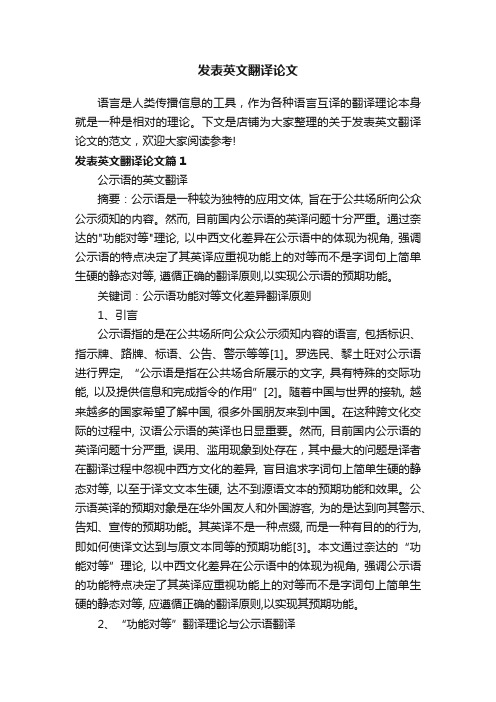
发表英文翻译论文语言是人类传播信息的工具,作为各种语言互译的翻译理论本身就是一种是相对的理论。
下文是店铺为大家整理的关于发表英文翻译论文的范文,欢迎大家阅读参考!发表英文翻译论文篇1公示语的英文翻译摘要:公示语是一种较为独特的应用文体, 旨在于公共场所向公众公示须知的内容。
然而, 目前国内公示语的英译问题十分严重。
通过奈达的"功能对等"理论, 以中西文化差异在公示语中的体现为视角, 强调公示语的特点决定了其英译应重视功能上的对等而不是字词句上简单生硬的静态对等, 遵循正确的翻译原则,以实现公示语的预期功能。
关键词:公示语功能对等文化差异翻译原则1、引言公示语指的是在公共场所向公众公示须知内容的语言, 包括标识、指示牌、路牌、标语、公告、警示等等[1]。
罗选民、黎土旺对公示语进行界定, “公示语是指在公共场合所展示的文字, 具有特殊的交际功能, 以及提供信息和完成指令的作用”[2]。
随着中国与世界的接轨, 越来越多的国家希望了解中国, 很多外国朋友来到中国。
在这种跨文化交际的过程中, 汉语公示语的英译也日显重要。
然而, 目前国内公示语的英译问题十分严重, 误用、滥用现象到处存在,其中最大的问题是译者在翻译过程中忽视中西方文化的差异, 盲目追求字词句上简单生硬的静态对等, 以至于译文文本生硬, 达不到源语文本的预期功能和效果。
公示语英译的预期对象是在华外国友人和外国游客, 为的是达到向其警示、告知、宣传的预期功能。
其英译不是一种点缀, 而是一种有目的的行为, 即如何使译文达到与原文本同等的预期功能[3]。
本文通过奈达的“功能对等”理论, 以中西文化差异在公示语中的体现为视角, 强调公示语的功能特点决定了其英译应重视功能上的对等而不是字词句上简单生硬的静态对等, 应遵循正确的翻译原则,以实现其预期功能。
2、“功能对等”翻译理论与公示语翻译公示语作为一个信息时代和经济全球化时代的标志之一, 公开面对公众, 给予公众行为需求的文字信息传递。
论转换法在英汉翻译中的应用论文范文

本科毕业论文(设计)范文1题目:论转换法在英汉翻译中的应用山东财经大学学士学位论文原创性声明本人郑重声明:所呈交的学位论文,是本人在导师的指导下进行研究工作所取得的成果。
除文中已经注明引用的内容外,本论文不含任何其他个人或集体已经发表或撰写过的研究成果。
对本文的研究做出重要贡献的个人和集体,均已在论文中作了明确的说明并表示了谢意。
本声明的法律结果由本人承担。
日期填写定稿日期5月1日。
教师学生都要手写签名学位论文作者签名:年月日山东财经大学关于论文使用授权的说明本人完全了解山东财经大学有关保留、使用学士学位论文的规定,即:学校有权保留、送交论文的复印件,允许论文被查阅,学校可以公布论文的全部或部分内容,可以采用影印或其他复制手段保存论文。
日期填写定稿日期5月1日。
教师学生都要手写签名指导教师签名:论文作者签名:年月日年月日On Application of Conversionin English-Chinese TranslationbyLiu XiaoUnder the Supervision ofLi WentaoSubmitted in Partial Fulfillment of the Requirements for the Degree of Bachelor of ArtsSchool of Foreign StudiesShandong University of Finance and EconomicsMay 2012AcknowledgementsUpon the completion of the thesis, first of all, I would like to express my heartfelt gratitude to my supervisor Prof. Li Wentao, for his enlightening guidance, incessant encouragement and careful modification throughout the process of writing this thesis. Without his patience and prudence, I could not have brought my thesis to its present form.Besides, I am also greatly indebted to other beloved teachers in the School of Foreign Studies of Shandong University of Finance and Economics, for their valuable and informative courses which have benefited me a lot during my college years.Last but not the least, I am also much obliged to all my friends who have helped me with my thesis.L. X.(名字的第一个字母)ABSTRACTOn Application of Conversionin English-Chinese TranslationLiu XiaoDue to the great differences between English and Chinese in grammar and expression style, translators may adopt the approaches of changing the word classes and sentence components in English-Chinese (E-C) translation. As a frequently-used translation technique, conversion enables translators to achieve a natural, fluent and accurate translation that not only conveys the original text’s information but also fits the idiomatic usage of Chinese.The thesis consists of three chapters. The first chapter examines the conversion of word classes in E-C translation such as conversion from English nouns or prepositions into Chinese verbs. The conversion of word classes usually results in the conversion of sentence components, so the second chapter discusses the conversion of sentence components. The third chapter explores the approaches of how to convert the English perspectives into the corresponding ones conforming to Chinese culture and thought pattern.Key words:conversion; word classes; sentence components; perspectives; E-C translation摘要论转换法在英汉翻译中的应用刘潇由于英汉两种语言在语法或表达习惯上存在巨大差异, 在英汉翻译的过程中,译者往往需要改变原文的词类或句子成分。
有关英汉翻译论文
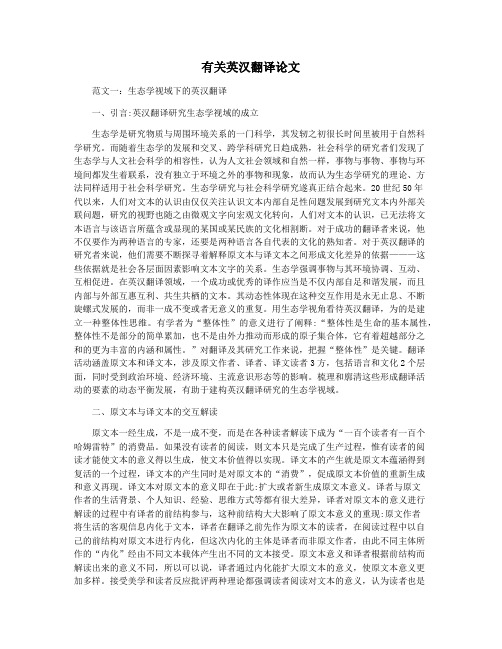
有关英汉翻译论文范文一:生态学视域下的英汉翻译一、引言:英汉翻译研究生态学视域的成立生态学是研究物质与周围环境关系的一门科学,其发轫之初很长时间里被用于自然科学研究。
而随着生态学的发展和交叉、跨学科研究日趋成熟,社会科学的研究者们发现了生态学与人文社会科学的相容性,认为人文社会领域和自然一样,事物与事物、事物与环境间都发生着联系,没有独立于环境之外的事物和现象,故而认为生态学研究的理论、方法同样适用于社会科学研究。
生态学研究与社会科学研究遂真正结合起来。
20世纪50年代以来,人们对文本的认识由仅仅关注认识文本内部自足性问题发展到研究文本内外部关联问题,研究的视野也随之由微观文字向宏观文化转向,人们对文本的认识,已无法将文本语言与该语言所蕴含或显现的某国或某民族的文化相割断。
对于成功的翻译者来说,他不仅要作为两种语言的专家,还要是两种语言各自代表的文化的熟知者。
对于英汉翻译的研究者来说,他们需要不断探寻着解释原文本与译文本之间形成文化差异的依据———这些依据就是社会各层面因素影响文本文字的关系。
生态学强调事物与其环境协调、互动、互相促进。
在英汉翻译领域,一个成功或优秀的译作应当是不仅内部自足和谐发展,而且内部与外部互惠互利、共生共栖的文本。
其动态性体现在这种交互作用是永无止息、不断旋螺式发展的,而非一成不变或者无意义的重复。
用生态学视角看待英汉翻译,为的是建立一种整体性思维。
有学者为“整体性”的意义进行了阐释:“整体性是生命的基本属性,整体性不是部分的简单累加,也不是由外力推动而形成的原子集合体,它有着超越部分之和的更为丰富的内涵和属性。
”对翻译及其研究工作来说,把握“整体性”是关键。
翻译活动涵盖原文本和译文本,涉及原文作者、译者、译文读者3方,包括语言和文化2个层面,同时受到政治环境、经济环境、主流意识形态等的影响。
梳理和廓清这些形成翻译活动的要素的动态平衡发展,有助于建构英汉翻译研究的生态学视域。
论文标题汉译英翻译三原则

课程教育研究 外语外文 ·20· follow her footstep and being deserted by her husband, we can conclude that Amanda’s miserable sufferings and tragic fate is doomed as long as she lives in the patriarchal society. And to make things even more pathetically, women in this play, including Laura, they didn’t realize the bondage and limitation the patriarchal society imposed on them. Williams’ reveal of the tragic fate of Amanda attract our attention to study feminism and advocate to build a equal society. Reference: [1]Beauvoir,Simone de. The Second Sex. Trans. Constance Borde and Sheila Malovany-Chevallier.Random House: Alfred A. Knopf,1949. [2]Bloom, Harold. Tennessee Williams. New York: Chelsea House Publishers,1987. [3]Showalter, Elaine.1995. The New Feminist Criticism[M]. New York: Pantheon Books. [4]Williams, Tennessee.1987. The Glass Menagerie[M]. New York: Penguin Group. [5]柏 棣.2007.西方女性主义文学理论[M].桂林:广西师范大学出版社。
英语专业翻译方向论文完整版 (1)
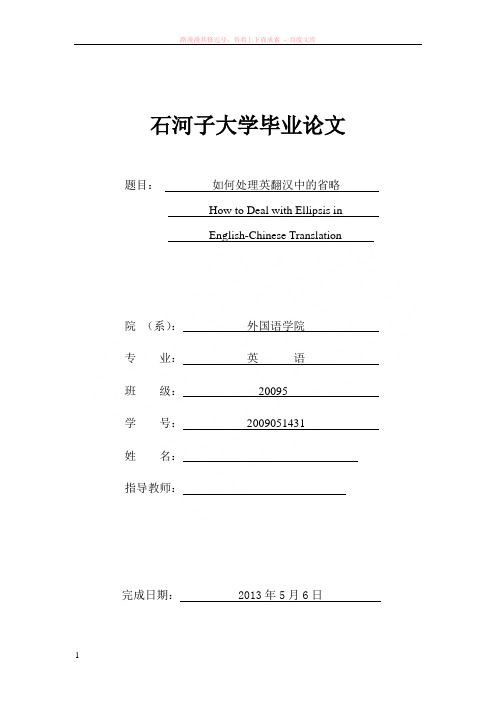
石河子大学毕业论文题目:如何处理英翻汉中的省略How to Deal with Ellipsis inEnglish-Chinese Translation院(系):外国语学院专业:英语班级:20095学号:2009051431姓名:指导教师:完成日期: 2013年5月6日ContentsI. Introduction (1)II. Literature Review (2)III. The Principles of Ellipsis (4)A. Omitted words must be useless and unnecessary in the translated works. (5)B. The meaning of the omitted words is implied in the test. (5)C. Omitted words are self-evident. (5)IV. The functions and application of ellipsis (5)A. The Coherence of the Meaning of Expression (6)B. The Coincidence of the Manner of Expression (6)1. Ellipsis of Articles (6)2. Ellipsis of Prepositions (7)3. Ellipsis of Pronouns (7)a. Ellipsis of Personal Pronouns (7)b. Ellipsis of Impersonal Indefinite Pronouns (8)c. Ellipsis of Relative Pronouns (8)4. Ellipsis of Conjunctions (9)a. Ellipsis of Coordinating Conjunctions (9)b. Ellipsis of Subordinate Conjunctions (9)5. Ellipsis of Rhetorics (9)V. Conclusion (10)Works Cited (11)AbstractWith the development of globalization, the world's political, economic and cultural communications are becoming increasingly frequent. Meanwhile, the role of translation cannot be ignored. Due to language and cultural disparity, reasonable translation is particularly important. How to deal with ellipsis in translation is one of the important aspects. The paper will explore ellipsis in English-Chinese translation from five aspects, which are ellipsis of pronouns, conjunctions, articles, prepositions, modifications, so as to achieve the purpose of smoother and clearer communication among China and English-speaking countries.Key words: cultural disparity; translation; ellipsis摘要随着全球化的不断发展,各国之间的政治、经济、文化交流日渐频繁。
硕士毕业论文英文翻译硕士毕业论文

硕士毕业论文英文翻译硕士毕业论文硕士毕业论文英文翻译篇1中英文翻译的现代教育方法一、引言21世纪经济全球话是全球化的首要表现,而全球化面临的一个重大障碍就是语言交流的障碍。
全球化大环境下的中国又处在经济全面对外开放的形式下,这就更加激起了外语学习的热潮。
如果说在我国改革开放初期国家主要需要的是专门学习外语翻译的人才,那么在经济全球化的今天,需要与外国人打交道的就远远不止是英语口语交流那么简单,现在的英语交流时全方位的多层次,涉及各个领域的交流,这就需要专门的英语翻译人才,从中英双反的文化背景的差异入手,真是的最大限度的还原交流双方所要表达的意思,起到促进中西方之间各方面的交流,那么怎样从中英文化差异入手进行翻译呢二、语言文化的差异在全球化与多文化背景的推动下,翻译活动越来越认同为一种文化传播与文化阐释。
三、英汉文化差异对翻译的重要影响(一)不同文化环境对翻译的影响环境文化指的是由于所处地域、自然地理环境不同,不同民族形成不同的思维定势以及文化。
比如,居住在西亚,北非的广大沙漠地区的阿拉伯人,长期的沙漠生活铸就了他们独特的沙漠文化,在阿拉伯语中与沙漠生活有关的词语极其丰富。
羊与骆驼是他们日常生活中重要的组成部分,是赖以生存的工具。
所以阿语中有关羊的名称很多,骆驼的名称更是多得惊人,据统计,阿语中的骆驼及与骆驼有关的事物名称共5644个。
玛雅人是中美洲印第安人的一个种族,他们常年生活在热带地区,一年当中只有两个季节,即旱季(laèche)和雨季(l’humide),所以在玛雅语中就不会出现通过温度、降雨量等差别来区分的“四季”“春、夏、秋、冬”(quatreaion,leprintemp,l’été,l’automne,l’hiver)这样的气候词语。
显然一个民族,一个国家的地理条件在不同程度上对文化以及语言发展起着很重要的作用。
如果不深入了解译语国环境文化,就会造成翻译的非等值,继而不能达到文化传真的目的。
毕业论文英文翻译
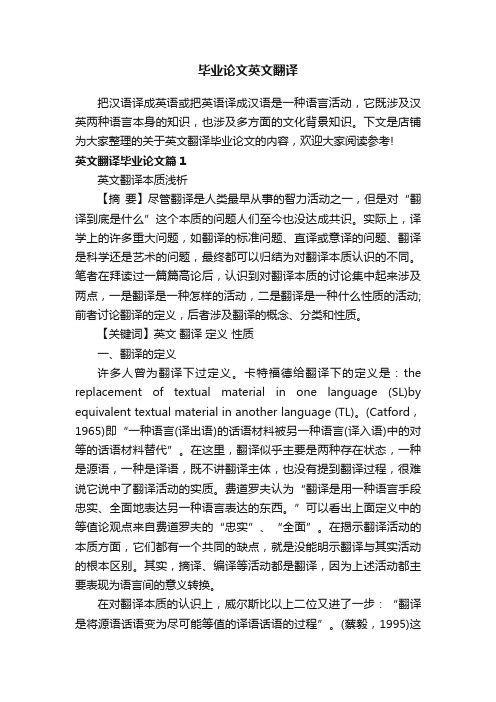
毕业论文英文翻译把汉语译成英语或把英语译成汉语是一种语言活动,它既涉及汉英两种语言本身的知识,也涉及多方面的文化背景知识。
下文是店铺为大家整理的关于英文翻译毕业论文的内容,欢迎大家阅读参考!英文翻译毕业论文篇1英文翻译本质浅析【摘要】尽管翻译是人类最早从事的智力活动之一,但是对“翻译到底是什么”这个本质的问题人们至今也没达成共识。
实际上,译学上的许多重大问题,如翻译的标准问题、直译或意译的问题、翻译是科学还是艺术的问题,最终都可以归结为对翻译本质认识的不同。
笔者在拜读过一篇篇高论后,认识到对翻译本质的讨论集中起来涉及两点,一是翻译是一种怎样的活动,二是翻译是一种什么性质的活动;前者讨论翻译的定义,后者涉及翻译的概念、分类和性质。
【关键词】英文翻译定义性质一、翻译的定义许多人曾为翻译下过定义。
卡特福德给翻译下的定义是:the replacement of textual material in one language (SL)by equivalent textual material in another language (TL)。
(Catford,1965)即“一种语言(译出语)的话语材料被另一种语言(译入语)中的对等的话语材料替代”。
在这里,翻译似乎主要是两种存在状态,一种是源语,一种是译语,既不讲翻译主体,也没有提到翻译过程,很难说它说中了翻译活动的实质。
费道罗夫认为“翻译是用一种语言手段忠实、全面地表达另一种语言表达的东西。
”可以看出上面定义中的等值论观点来自费道罗夫的“忠实”、“全面”。
在揭示翻译活动的本质方面,它们都有一个共同的缺点,就是没能明示翻译与其实活动的根本区别。
其实,摘译、编译等活动都是翻译,因为上述活动都主要表现为语言间的意义转换。
在对翻译本质的认识上,威尔斯比以上二位又进了一步:“翻译是将源语话语变为尽可能等值的译语话语的过程”。
(蔡毅,1995)这里没有硬性规定,只是说“尽可能等值”。
英汉翻译论文选题题目参考
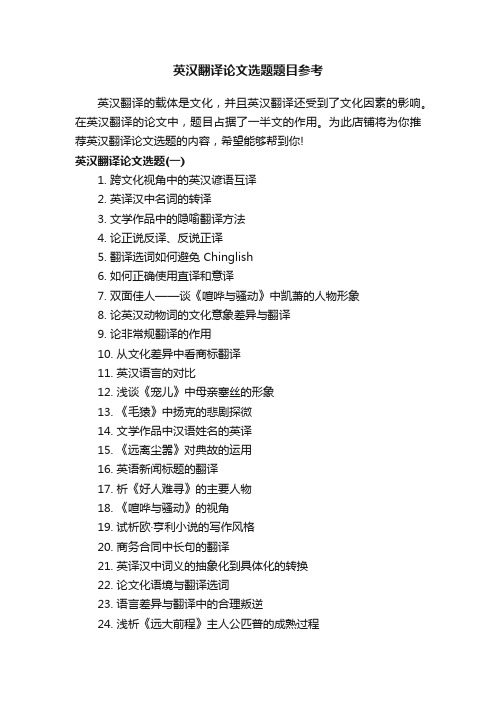
英汉翻译论文选题题目参考英汉翻译的载体是文化,并且英汉翻译还受到了文化因素的影响。
在英汉翻译的论文中,题目占据了一半文的作用。
为此店铺将为你推荐英汉翻译论文选题的内容,希望能够帮到你!英汉翻译论文选题(一)1. 跨文化视角中的英汉谚语互译2. 英译汉中名词的转译3. 文学作品中的隐喻翻译方法4. 论正说反译、反说正译5. 翻译选词如何避免 Chinglish6. 如何正确使用直译和意译7. 双面佳人——谈《喧哗与骚动》中凯萧的人物形象8. 论英汉动物词的文化意象差异与翻译9. 论非常规翻译的作用10. 从文化差异中看商标翻译11. 英汉语言的对比12. 浅谈《宠儿》中母亲塞丝的形象13. 《毛猿》中扬克的悲剧探微14. 文学作品中汉语姓名的英译15. 《远离尘嚣》对典故的运用16. 英语新闻标题的翻译17. 析《好人难寻》的主要人物18. 《喧哗与骚动》的视角19. 试析欧·亨利小说的写作风格20. 商务合同中长句的翻译21. 英译汉中词义的抽象化到具体化的转换22. 论文化语境与翻译选词23. 语言差异与翻译中的合理叛逆24. 浅析《远大前程》主人公匹普的成熟过程25. 论翻译中的中国英语26. 翻译中的英汉文化差异27. 劳伦斯笔下的悲剧性人物保罗英汉翻译论文选题(二)1. 语法翻译法在中学英语教学中的应用2. 中学英语语法课堂多媒体技术运用的优势3. 汉语宣传资料英译探讨4. 体现在中英习语中的文化差异5. 英语学习中对美国俚语的认识6. 电影片名英汉互译的归化与异化及翻译的相关技巧7. 浅析中国英语8. 大卫·科波菲尔中的批判现实主义9. ”信”与英语比喻翻译10. 佩科拉的悲剧探源11. 论凯瑟琳·曼斯菲尔德《园会》中的艺术特色12. 中学英语阅读教学中的文化差异渗透13. 口译中的笔记及实际运用中的障碍14. 浅析委婉语及其语用功效英汉翻译论文选题(三)1. 汉译英中的文化差异——词汇空缺与中国特色文化翻译2. Questioning and Teaching of Reading3. 英汉动物比喻的文化内涵及差异4. (动物比喻在英汉两种文化的内涵及差异)5. 哈代——具有乡土田园气息的作家6. 英语语言中的性别歧视(主义)7. 浅析英语语篇中的词汇衔接8. 浅谈景点名称的英译9. 英汉禁忌语和委婉语对比研究10. 广告翻译中的修辞手法11. 不同语境中的翻译12. 直译与意译13. 浅谈中国式英语的现象14. 英汉翻译中文化特性的处理15. 英汉谚语比较16. 英文广告中双关语及其翻译17. 商标翻译中的文化因素18. 英美文化差异与颜色词的翻译19. 论英语俚语的汉译。
关于英汉翻译论文范文
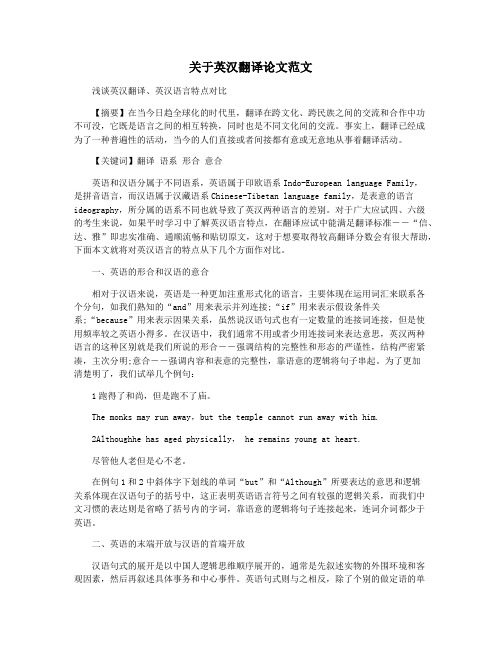
关于英汉翻译论文范文浅谈英汉翻译、英汉语言特点对比【摘要】在当今日趋全球化的时代里,翻译在跨文化、跨民族之间的交流和合作中功不可没,它既是语言之间的相互转换,同时也是不同文化间的交流。
事实上,翻译已经成为了一种普遍性的活动,当今的人们直接或者间接都有意或无意地从事着翻译活动。
【关键词】翻译语系形合意合英语和汉语分属于不同语系,英语属于印欧语系Indo-European language Family,是拼音语言,而汉语属于汉藏语系Chinese-Tibetan language family,是表意的语言ideography,所分属的语系不同也就导致了英汉两种语言的差别。
对于广大应试四、六级的考生来说,如果平时学习中了解英汉语言特点,在翻译应试中能满足翻译标准――“信、达、雅”即忠实准确、通顺流畅和贴切原文,这对于想要取得较高翻译分数会有很大帮助,下面本文就将对英汉语言的特点从下几个方面作对比。
一、英语的形合和汉语的意合相对于汉语来说,英语是一种更加注重形式化的语言,主要体现在运用词汇来联系各个分句,如我们熟知的“and”用来表示并列连接;“if”用来表示假设条件关系;“because”用来表示因果关系,虽然说汉语句式也有一定数量的连接词连接,但是使用频率较之英语小得多。
在汉语中,我们通常不用或者少用连接词来表达意思,英汉两种语言的这种区别就是我们所说的形合――强调结构的完整性和形态的严谨性,结构严密紧凑,主次分明;意合――强调内容和表意的完整性,靠语意的逻辑将句子串起。
为了更加清楚明了,我们试举几个例句:1跑得了和尚,但是跑不了庙。
The monks may run away,but the temple cannot run away with him.2Althoughhe has aged physically, he remains young at heart.尽管他人老但是心不老。
本科毕业论文关于英文翻译
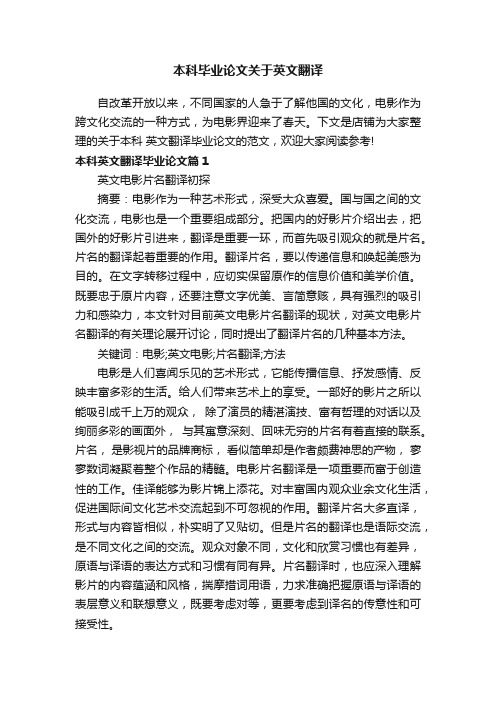
本科毕业论文关于英文翻译自改革开放以来,不同国家的人急于了解他国的文化,电影作为跨文化交流的一种方式,为电影界迎来了春天。
下文是店铺为大家整理的关于本科英文翻译毕业论文的范文,欢迎大家阅读参考!本科英文翻译毕业论文篇1英文电影片名翻译初探摘要:电影作为一种艺术形式,深受大众喜爱。
国与国之间的文化交流,电影也是一个重要组成部分。
把国内的好影片介绍出去,把国外的好影片引进来,翻译是重要一环,而首先吸引观众的就是片名。
片名的翻译起着重要的作用。
翻译片名,要以传递信息和唤起美感为目的。
在文字转移过程中,应切实保留原作的信息价值和美学价值。
既要忠于原片内容,还要注意文字优美、言简意赅,具有强烈的吸引力和感染力,本文针对目前英文电影片名翻译的现状,对英文电影片名翻译的有关理论展开讨论,同时提出了翻译片名的几种基本方法。
关键词:电影;英文电影;片名翻译;方法电影是人们喜闻乐见的艺术形式,它能传播信息、抒发感情、反映丰富多彩的生活。
给人们带来艺术上的享受。
一部好的影片之所以能吸引成千上万的观众,除了演员的精湛演技、富有哲理的对话以及绚丽多彩的画面外,与其寓意深刻、回味无穷的片名有着直接的联系。
片名,是影视片的品牌商标,看似简单却是作者颇费神思的产物,寥寥数词凝聚着整个作品的精髓。
电影片名翻译是一项重要而富于创造性的工作。
佳译能够为影片锦上添花。
对丰富国内观众业余文化生活,促进国际间文化艺术交流起到不可忽视的作用。
翻译片名大多直译,形式与内容皆相似,朴实明了又贴切。
但是片名的翻译也是语际交流,是不同文化之间的交流。
观众对象不同,文化和欣赏习惯也有差异,原语与译语的表达方式和习惯有同有异。
片名翻译时,也应深入理解影片的内容蕴涵和风格,揣摩措词用语,力求准确把握原语与译语的表层意义和联想意义,既要考虑对等,更要考虑到译名的传意性和可接受性。
一、英文电影片名翻译现状(一)一片多名的问题日前,电影片名翻译中存在着混乱、不规范的现象,一片多名的问题较突出。
翻译英语毕业论文范文3篇

翻译英语毕业论⽂范⽂3篇英语毕业论⽂:论功能翻译理论摘要:中国传统翻译理论只有宏观的论述,缺乏⽅法论,操作性不强。
本⽂简述了功能翻译理论,详细地探讨了该理论的理论基础,并⽤关联理论予以论证,丰富了它的内容。
关键词:功能翻译理论;基础理论;阐释Abstract:Chinesetraditionaltranslationtheoryconsistsonlyoftranslationprincipleswithoutconcretemethodologyanditcannotbeappliedtopracticaltranslating.Thispapergivesabriefaccounttofunctionaltranslationtheory,prob Keywords:functionaltranslationtheory;basictheory;exposition功能翻译理论强调,翻译是⼀种特殊的交际形式,涉及三种⽂本:原语⽂本、译者的图式⽂本和译语⽂本。
对于原语⽂本,最重要的是抓住作者的修辞功能正确理解原语的修辞功能,是产⽣理想的图式⽂本的关键。
⽽正确把握原⽂的认知图式⼜是正确理解原⽂修辞功能的基础。
理想的图式⽂本来⾃原⽂的认知图式,来⾃对原⽂作者的修辞意图的准确把握。
在这个图式⽂本的基础上,产⽣怎样的译语⽂本,除了修辞功能等值之外,还应该考虑翻译的⽬的和读者对象。
⼀、功能翻译理论简述(⼀)、功能翻译理论的要点根据杂志上发表的论⽂、学术会议上宣读的论⽂、学术报告和出版的专著,功能翻译理论的要点简述如下:1、分析概念段(conceptualparagraph,具有明确主题意义⼀个或多个⾃然段)和句⼦的修辞功能,使修辞功能的形式重现,从形式的等同中求得功能的等值,意义的等值,这种翻译叫做功能翻译。
翻译应该是在修辞功能等值的前提下,遵守“信、达、X”规范;⽂体不同,翻译的⽬的不⼀样,X不⼀样。
[英汉语言对比]英汉语言对比论文
![[英汉语言对比]英汉语言对比论文](https://img.taocdn.com/s3/m/fea35f49302b3169a45177232f60ddccda38e6da.png)
[英汉语言对比]英汉语言对比论文篇一: 英汉语言对比论文英汉句法现象对比研究与翻译摘要:英汉两种语言在句法结构方面有很大的差异,其中英汉句法差异是英汉翻译的难点之一,也是影响翻译水平的重要因素之一。
本文将通过对英语和汉语两种不同语言的句法现象进行对比分析,来探索翻译的技巧。
关键词:英语汉语句法现象翻译A Contrastive Study of English and Chinese Syntax structure and Translation Abstract: English and Chinese possess so many differences in syntax structure, which is one of the difficulties in translation, as well as one of the factors affecting translation quality. The paper makes a comparison of two kinds of syntax structures, in order to seek better ways in translation.Key Words: English; Chinese; syntax structure; contrastive study; translation 0. 引言语言本身是一种文化现象,它既是文化的载体,又受到文化的影响和制约。
汉语和英语是世界上的两大语言,各代表着东西方的两种文化。
由于受到汉语负迁移的影响,运用英语进行表达时,虽然语法和词汇用对,但常出现一些不符合英语表达习惯的句子,主要是英汉句法结构不同表达的语用失误。
因为英语和汉语在很多方面完全不同,中国语言学家喜欢按照文化背景差异分析两者的不同。
中国学者陆国强教授写的关于英语和汉语的《语义结构对比分析》一书,从语义方面比较英语和汉语。
英语翻译论文
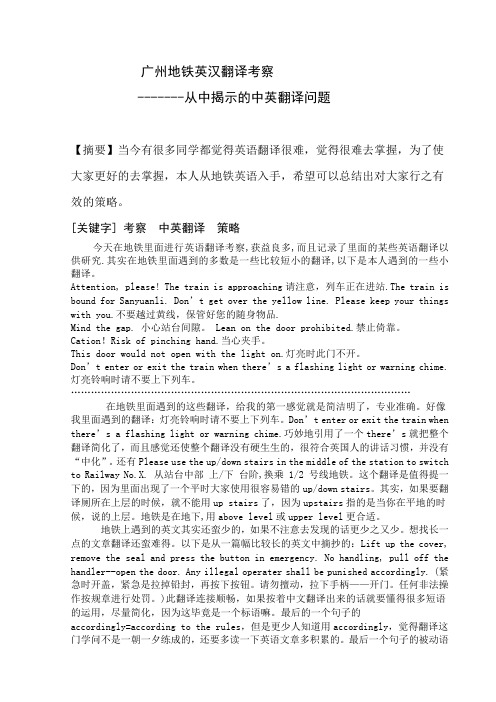
广州地铁英汉翻译考察-------从中揭示的中英翻译问题【摘要】当今有很多同学都觉得英语翻译很难,觉得很难去掌握,为了使大家更好的去掌握,本人从地铁英语入手,希望可以总结出对大家行之有效的策略。
[关键字] 考察中英翻译策略今天在地铁里面进行英语翻译考察,获益良多,而且记录了里面的某些英语翻译以供研究.其实在地铁里面遇到的多数是一些比较短小的翻译,以下是本人遇到的一些小翻译。
Attention, please! The train is approaching请注意,列车正在进站.The train is bound for Sanyuanli. Don’t get over the yellow line. Please keep your things with you.不要越过黄线,保管好您的随身物品.Mind the gap. 小心站台间隙。
Lean on the door prohibited.禁止倚靠。
Cation!Risk of pinching hand.当心夹手。
This door would not open with the light on.灯亮时此门不开。
Don’t enter or exit the train when there’s a flashing light or warning chime.灯亮铃响时请不要上下列车。
…………………………………………………………………………………………在地铁里面遇到的这些翻译,给我的第一感觉就是简洁明了,专业准确。
好像我里面遇到的翻译:灯亮铃响时请不要上下列车。
Don’t enter or exit the train when there’s a flashing light or warning chime.巧妙地引用了一个there’s就把整个翻译简化了,而且感觉还使整个翻译没有硬生生的,很符合英国人的讲话习惯,并没有“中化”。
英文学术论文翻译-中英文对照(三)
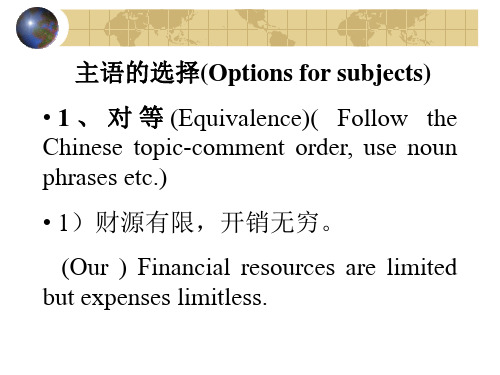
•These new measures will, we believe, increase the people’s purchasing power and lead to thriving financial and commercial conditions rather than make a mess of the country’s finances as some people argue.
一、主谓单句
汉语的主谓单句,从外形结构 上来看,跟英语的“主谓”结构是 相似的,但它的主语和谓语表达却 与英语有许多不同的地方。所以翻 译汉语主谓单句时,至少应注意几 个问题。
1、防止主语的机械对应。 中国近几年来发生了巨变。 ①There have been great changes in China these years. ②These years have seen (witnessed) great changes in China. ③Great changes have taken place in China these years. ④China crackles with the dynamics of changes these years.
汉语的基本句型及其翻译
汉语造句以名词为重心,以词组、散句和 分句为手段,善于按时间、逻辑顺序进行横 排式叙述,有时断句不严,外形松散。有人 称汉语是时间型的动态结构,主要体现于形 式自由,富于弹性。
英语则以“主—谓”主干结构为重心来统 领各种语言成分,句界分明,外形严密。 因此,汉语各种句型译成英语时,不仅在 逻辑关系上而且在外形上都应该体现出英语 句法结构的特点。
2-3 Reversing • 1)沿路都是小商店。 Small shops dot the way. • 2)他这样悍然行事使我们非常气恼。 Hot anger burned in our minds against him at his rashness.
关于英语翻译方向的论文范文

翻译在跨文化、跨民族之间的交流和合作中功不可没,英语翻译,它既是语言之间的相互转换,同时也是不同文化间的交流。
下文是为大家整理的英语翻译的论文的范文,欢迎大家阅读参考!英语翻译的论文篇1文化空缺与英汉翻译摘要:不同民族的语言产生于不同的文化背景,所承载的文化也不尽相同,这就必然导致两种语言在表达方式上存在很多相异之处,文化空缺就是这些差异的极端表现,它是一个民族语言和文化与其它民族语言和文化的异质性的充分体现,这无疑增加了翻译的难度。
所以文化空缺的翻译不仅是语言的迁移,更是文化的传播。
关键词:文化空缺英汉翻译翻译作为人类最早进行的交流活动之一,一直在不同的语言集团间沟通信息,对人类社会的发展和进步有非常重要的作用。
正是由于翻译所起的中介作用,民族间才可以互通有无、互相学习、共同发展。
跨文化交际学和文化语言学的兴起与发展,为语言与文化的研究带来了勃勃生机。
而作为跨文化交际的翻译,也因此而更加受到重视,对它的研究也呈现出多角度、多侧面、开放性的特点。
翻译作为不同语言之间人们交流思想和文化不可或缺的手段,在传播文化信息、促进不同民族间的相互了解与民族融合的过程中的重要作用已日益凸显。
翻译界对翻译理论研究的重心从译意到译信息再到以文化为导向的翻译,正说明翻译实质是文化的翻译。
如Banet&ameacroagreatmanoungfriend,2Brightanddiigent,3Doeceedingweintudie,4buttheareratherweainChinee,5evencan’,the’athearenotinteretedinChinee请看张培基先生的译文:Ihavecomeacroagreatmanbrightanddiigentoungfriendwhoha vedoneeceedingweintheirtudie,,theaidthewerenotinteretedintheChineeanguage英语的从句前必须根据其语法功能用when,where,who,that,的一种表现。
英汉语言的异同及其翻译策略论文

英汉语言的异同及其翻译策略论文在英汉翻译中,两种语言在词汇方面的不同主要体现在词的意义,词的顺序和词的搭配能力三个方面;从句法方面来说,英语和汉语在句子结构,句子顺序和其他一些表达方式上则有各自的特点。
下面笔者就从词汇现象和句法现象两方面来探讨英汉的对应程度如何,以及根据这些对比,在进行翻译实践时,应该运用哪些翻译技巧。
1 英汉语言的对比1.1 英汉词汇现象的对比首先,从词的意义方面来看。
词汇作为语言的三要素之一,相比于语音和语法,它的变化最快。
随着社会和科学的不断发展和变化,在语言中一方面增加了新词,一方面旧词增添了新的意义。
人类发明轮船以前,用的是帆船,英语“sail”一词原意为“帆”,短语“set sail”,就有张帆起航之意。
但是随着社会的发展,帆船逐渐被用煤,柴油,甚至是用核动力的轮船所代替。
自从潜艇出现后,“sail”这个词又增添了“潜艇指挥塔”的新含义。
这就是词义的发展变化,我们在对比英汉语言时,应该明确它们的对应情况是随着时间的变迁和社会的发展而发展变化着的。
英语词汇在汉语里的对应程度,大致可以归纳为四种情况。
第一,完全对应。
英语中的词所表达的意义,可以在汉语里找到完全对应的词来表达。
如“computational linguistics”(计算语言学),“The U.S. State Department”(美国国务院)。
这主要是一些已有通用译名的专用名词,术语和生活中常见事物名称等。
第二,部分对应。
英语中有些词和汉语中的词汇在词义上只能部分对应,体现在有广义和狭义之分。
如“morning”(上午,早晨),“gun”(枪,炮),一个英语单词相对应有较多的汉语意义 . 第三 ,无对应。
英语中有些词或汉语里有些词在对方语言里找不到对应的词来表达。
这主要是指一些新词以及反映社会特殊风俗和事物的词。
如英语单词“beddo”(指的是一种多用途的床),“plumber”(美国调查政府雇员泄密的特工),“brunch”(为了休闲和放松 ,通常周日才吃的早午餐);汉语里如“八仙桌”,“太师椅”等在英语中都无法找到对应的词。
2000字外语翻译论文:英文翻译.doc
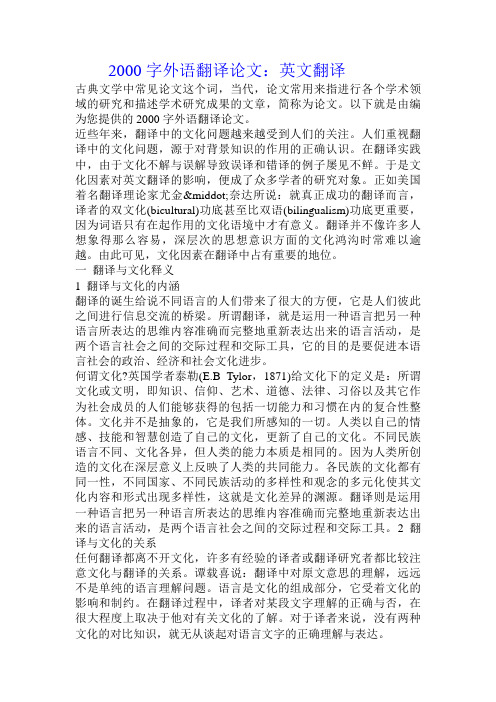
2000字外语翻译论文:英文翻译古典文学中常见论文这个词,当代,论文常用来指进行各个学术领域的研究和描述学术研究成果的文章,简称为论文。
以下就是由编为您提供的2000字外语翻译论文。
近些年来,翻译中的文化问题越来越受到人们的关注。
人们重视翻译中的文化问题,源于对背景知识的作用的正确认识。
在翻译实践中,由于文化不解与误解导致误译和错译的例子屡见不鲜。
于是文化因素对英文翻译的影响,便成了众多学者的研究对象。
正如美国着名翻译理论家尤金·奈达所说:就真正成功的翻译而言,译者的双文化(bicultural)功底甚至比双语(bilingualism)功底更重要,因为词语只有在起作用的文化语境中才有意义。
翻译并不像许多人想象得那么容易,深层次的思想意识方面的文化鸿沟时常难以逾越。
由此可见,文化因素在翻译中占有重要的地位。
一翻译与文化释义1 翻译与文化的内涵翻译的诞生给说不同语言的人们带来了很大的方便,它是人们彼此之间进行信息交流的桥梁。
所谓翻译,就是运用一种语言把另一种语言所表达的思维内容准确而完整地重新表达出来的语言活动,是两个语言社会之间的交际过程和交际工具,它的目的是要促进本语言社会的政治、经济和社会文化进步。
何谓文化?英国学者泰勒(E.B Tylor,1871)给文化下的定义是:所谓文化或文明,即知识、信仰、艺术、道德、法律、习俗以及其它作为社会成员的人们能够获得的包括一切能力和习惯在内的复合性整体。
文化并不是抽象的,它是我们所感知的一切。
人类以自己的情感、技能和智慧创造了自己的文化,更新了自己的文化。
不同民族语言不同、文化各异,但人类的能力本质是相同的。
因为人类所创造的文化在深层意义上反映了人类的共同能力。
各民族的文化都有同一性,不同国家、不同民族活动的多样性和观念的多元化使其文化内容和形式出现多样性,这就是文化差异的渊源。
翻译则是运用一种语言把另一种语言所表达的思维内容准确而完整地重新表达出来的语言活动,是两个语言社会之间的交际过程和交际工具。
国际关系专业英语英汉互译(论文资料)

国际关系专业英语英汉互译1、1997年10月中国国家主席江泽民访问美国,江主席与克林顿总统就建立面向21世纪的建设性战略伙伴关系达成了一致看法。
克林顿总统宣布,他将提前于今年(1998)6月底访华,以便进一步改善并促进中美关系的发展。
In October 1997, when China’s President JiangZemin visited the U.S., he and President Clinton reached agreement in the setting up of a constructive, strategic Partnership for the 21st Century. President Clinton has announced this year that he will move up his visit to China to the end of June in order to give fresh stimulus to the development and improvement of Sino-U.S. relations.2.谢谢!秘书长先生,主席先生及各位尊敬的代表,先生们、女士们:我们以和平为己任,会聚在这个大厅,我们所在的这座城市已留下了暴力的创伤,我们所在的这个国家正在危急中觉醒,我们所在的这个世界正团结一心,准备与恐怖势力进行长期的斗争。
今天,出席会议的每一位文明国家的代表都在以自己的决心,以最基本的文明准则向世界承诺:我们将坚决打击恐怖势力和非法暴力,保护我们自己,捍卫我们的未来。
Thank you. Mr. Secretary General, Mr. President, distinguished delegates and ladies and gentlemen. We meet in a hall devoted to peace, in a city scarred by violence, in a nation awakened to danger, in a world uniting for a long struggle. Every civilized nation here today is resolved to keep the most basic commitment of civilization: we will defend ourselves and our future against terror and lawless violence.3、国际关系发展事态的不可预见性常常弄得专家们措手不及,如:1989年柏林墙事件。
- 1、下载文档前请自行甄别文档内容的完整性,平台不提供额外的编辑、内容补充、找答案等附加服务。
- 2、"仅部分预览"的文档,不可在线预览部分如存在完整性等问题,可反馈申请退款(可完整预览的文档不适用该条件!)。
- 3、如文档侵犯您的权益,请联系客服反馈,我们会尽快为您处理(人工客服工作时间:9:00-18:30)。
English-Chinses Translation09英语4班许芯铜200915310432Qinggong CollegeHebei United UniversityOctober , 2011The Comparison between English and ChineseI.Synthetic VS AnalyticA synthetic language is characterized by frequent and systematic use of inflected forms to express grammatical relationships.An analytic language is marked by a relatively frequent use of functions words, auxiliary verbs, and charges in word order to express syntactic relations, rather than of inflected forms.English is a synthetic-analytic language.Chinese is a typical analytic language.1.In English nouns, pronouns, and verbs are inflected, Chinese isnon-inflectional. The above grammatical meanings are mostly implied in contexts or between the lines.Eg. He moved astonishingly fast.He moved with astonishing rapidity.His movements were astonishingly rapidity.His rapid movements astonished us.His movements astonished us by their rapidity.The rapidity of his movements was astonishing.The rapidity with which he moved astonished us.He astonished us by moving rapidly.He astonished us by his rapid movements.He astonished us by the rapidity of his movements.(Jespersen 1924)他的行动,快得惊人。
他行动的速度快得令人惊讶。
他行动速度之快,令人惊讶。
他的快速行动使我们感到惊讶。
我们对他的快速行动感到惊讶。
The English inflection, though few in numbers, are an integral and essential part of the language. The excessive frequency of these forms gives them great morphological weight. We cannot but accept Sayce’s dictum, “once inflectional, always inflectional”. Hence, while English appears as almost uninflectional when compared with such a language as Latin, it appears in the opposite light when compared with an isolating language such as Chinese.2. Word order in English is not so rigid as in Chinese. More ways of inversion, grammatical or rhetorical are often seen in English.The flexible word order in English is mainly the result of the grammatical concord of words in the sentence which is achieved by inflection.When expressing temporal or logical sequences, English may make full use of inflections and function words to make its word order flexible, while Chinese, with the help of function words, arranges its word order according to certain rules of temporal or logical sequences.3. English functions words include the articles, prepositions, auxiliary verbs, coordinators and subordinators, while Chinese function words include particles, connectives, and prepositions. Each has its own features in the use of these words.Chinese is rich in particles, which can be classified into aspect particles, structural particles, and emotional particles. The frequent use of Chinese particles is a hard nut for foreign learners of Chinese.Eg. 这回我可亲眼看见啦!This time I’ve actually seen it for myself. English has a large number of prepositions and prepositional phrases which are often in use, which Chinese has a few prepositions which are mostly “borrowed” from their corresponding verbs. A conversion of English perversion of English prepositions into Chinese verbs is often necessary.Eg. Peter drew his knife on the robber. 彼得拔刀向那个强盗砍去。
4. English frequently uses its various connectives, coordinating or subordinating, including conjunctive and relative pronouns or adverbs, such as who, whose, that, what, which, when, where, why, and how. Chinese has no such kind of conjunctives and relatives, and other connectives are not often used, except in formal writings.Eg. Practically all substances expand when heated and contract when cooled. 几乎所有的物质都是热胀冷缩的。
English is an intonation language while Chinese is a tone language. One of the important features in modern Chinese is the predominance of disyllables and quadrisyllables over monosyllables and trisyllables. As a result, reduplication of characters, repetition of words, four-character expressions, and parallelism of syllables, words, phrases, and sentence structures have popular Chinese grammatical and rhetorical devices.II. Rigid VS SuppleEnglish subject-predicate structure appears rigid as a result of certain grammatical bonds, including the patternization and the principles of grammatical and notional concord.Chinese, however, is relatively free from the government of S-V concord and formal markers. The subject-predicate structure is usually varied, flexible, and therefore complicated and supple.Eg. He has a daughter, who works in Beijing. Someone has phoned her and it is said that she will be back tomorrow.他有个女儿,在北京工作,已经打电话过去了,听说明天就能回来。
